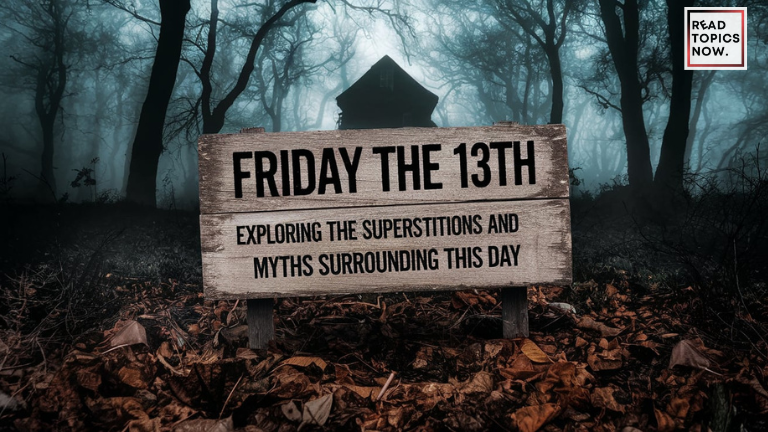
Friday the 13th: Exploring the Superstitions and Myths Surrounding This Day

Friday the 13th is a day steeped in superstition, myths, and cultural fear. For centuries, this day has held a prominent place in folklore, with many associating it with bad luck, ominous events, and eerie happenings. In this article, we will take a deep dive into the origins, myths, and significance of Friday the 13th, exploring why it continues to evoke fear and intrigue worldwide.
The Historical Origins of Friday the 13th
The fear of Friday the 13th, known as paraskevidekatriaphobia, has its roots in several historical and religious contexts. Both Friday and the number 13 have been considered unlucky for centuries. In Norse mythology, for example, 12 gods were invited to a dinner party in Valhalla. The trickster god Loki, who was not invited, arrived as the 13th guest, causing chaos that led to the death of the beloved god Balder. This event is often cited as an origin for the number 13’s association with bad luck.
The Religious Context
Christian tradition also contributes to the negative connotations surrounding Friday the 13th. The crucifixion of Jesus Christ is believed to have occurred on a Friday, which is why Fridays were often considered unlucky in medieval times. Additionally, there were 13 people present at the Last Supper, with Judas, the betrayer of Christ, often regarded as the 13th guest. This combination of Friday and the number 13 created a superstition that lingers today.
The Psychological Impact of Friday the 13th
The belief that something bad will happen on Friday the 13th can create a self-fulfilling prophecy. This phenomenon, where people’s anxiety or fear of bad luck actually contributes to negative outcomes, is well-documented in psychology. Many people experience heightened anxiety or fear as the day approaches, resulting in increased reports of accidents, illnesses, or other mishaps, reinforcing the belief in Friday the 13th’s unlucky nature.
Modern Media Influence
In addition to its historical roots, the fear of Friday the 13th has been reinforced by modern media. The “Friday the 13th” movie franchise, which debuted in 1980, has become a cultural touchstone for horror enthusiasts. The series, with its infamous character Jason Voorhees, has cemented the day’s association with terror and misfortune in popular culture.
Debunking the Myths: Is Friday the 13th Truly Unlucky?
Despite the widespread fear, there is no scientific evidence to suggest that Friday the 13th is inherently unlucky. Statistical studies have been conducted to examine whether the day has a higher incidence of accidents, injuries, or disasters, and the results are inconclusive. In fact, some research suggests that fewer accidents occur on this day because people tend to be more cautious.
Notable Events on Friday the 13th
While the superstition persists, it is important to note that many major events that have occurred on Friday the 13th have no correlation with bad luck. Some examples include:
- The launch of the Apollo 13 mission on April 11, 1970, which faced critical issues but ultimately ended with the safe return of its crew.
- The release of Alfred Hitchcock’s “Psycho”, a legendary horror film, on June 16, 1960, which also happened to be a Friday the 13th.
Global Perspectives: How Different Cultures View Friday the 13th
The superstition around Friday the 13th is largely a Western phenomenon, but different cultures have their own versions of unlucky days and numbers. For example:
- In Spain and Greece, Tuesday the 13th (known as Martes Trece) is considered unlucky, rather than Friday.
- In Italy, Friday the 17th is traditionally seen as a day of misfortune.
These variations highlight how beliefs around certain dates can be influenced by cultural and historical factors.
How to Overcome the Fear of Friday the 13th
For those who experience genuine fear or anxiety on Friday the 13th, there are steps that can be taken to alleviate these feelings. Psychologists recommend practices such as cognitive behavioral therapy (CBT) to help reframe negative thoughts. Additionally, grounding techniques, mindfulness, and focusing on positive events can help individuals overcome irrational fears associated with the day.
Practical Tips for a Fear-Free Friday the 13th
- Practice mindfulness: Engaging in mindfulness exercises can help reduce anxiety and bring awareness to irrational thoughts.
- Focus on positive outcomes: Remind yourself that many people go through the day without experiencing any bad luck.
- Avoid reinforcing negative beliefs: Do not alter your plans based on the date alone; live your day as you normally would.
Conclusion: Separating Fact from Fiction
Friday the 13th remains one of the most enduring superstitions in modern society. While its roots are deeply entrenched in religious and historical contexts, the actual evidence for its association with bad luck is minimal. Whether one believes in the superstition or not, it is clear that the power of belief, reinforced by cultural narratives, continues to keep the myth alive.
Get Curated Post Updates!
Sign up for my newsletter to see new photos, tips, and blog posts.






